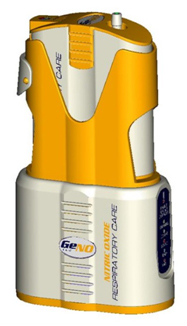Novel Nitric Oxide Delivery System May Someday Improve PH Treatments

 GeNo LLC, a pharmaceutical company developing a line of innovative nitric oxide drug products, is currently testing next-generation inhaled nitric oxide (NO) drug delivery systems for use in both hospital and outpatient settings that could come to impact treatments for those with pulmonary hypertension.
GeNo LLC, a pharmaceutical company developing a line of innovative nitric oxide drug products, is currently testing next-generation inhaled nitric oxide (NO) drug delivery systems for use in both hospital and outpatient settings that could come to impact treatments for those with pulmonary hypertension.
Nitric oxide is a naturally occurring cellular signaling molecule that can function as an important biological regulator and has a crucial role in pulmonary medicine, cardiology, neuroscience and immunology. It has been shown to be a potent vasodilator, since it causes blood vessels to relax and widen, reducing blood pressure and increasing blood flow through the lungs, this way increasing the amount of oxygen captured by red blood cells.
The basis of GeNo LLC NO delivery system is a proprietary reactor cartridge that converts NO2 gas into highly purified, therapeutic NO. This allows the production of NO from small amounts of liquid N02.
[adrotate group=”4″]
The company currently has two experimental delivery systems being developed, the GeNOsylTM Acute DS for use in the hospital setting, and GeNOsylTM Chronic DS as a lightweight system that can be worn by patients with chronic diseases such as PH for use outside of the hospital setting.
Last year, the company presented their clinical results on the GeNOsyl™ delivery systems at the American College of Cardiology and American Thoracic Society Medical Meetings, where they showed three different clinical presentations.
“Nitric Oxide Treatment of Right Ventricular (RV) Failure Associated with the Use of a Left Ventricular Assist Device (LVAD) and Hypoxemia-induced Pulmonary Hypertension” showed pre-clinical data whereby inhalation of NO via GeNO’s delivery system decreased pulmonary vascular resistance (PVR) and right ventricular (RV) distension, increased RV ejection, and increased the maximum achievable left ventricular assist device (LVAD) speed and flow in an animal model with LVAD associated RV failure and hypoxemia induced pulmonary hypertension (PH).
“Ambulatory System for the Delivery of Nitric Oxide (NO) Derived from Liquid Dinitrogen Tetroxide (N2O4)” showed pre-clinical data in which a small volume of liquid rather than cylinders of compressed gas were successfully used to delivery inhaled NO to a mammal, using GeNO’s proprietary cartridge technology. NO derived from liquid dinitrogen tetroxide (N2O4) was proven to lower mean pulmonary arterial pressure (mPAP) and PVR in a mammal.
Finally, “A Phase 2 Open Label Pilot Study Evaluating Preliminary Safety and Performance of the GeNO Nitrosyl Delivery System,” published in the ATS Journal, demonstrated that NO could be delivered in adult pulmonary arterial hypertension (PAH) patients with GeNO’s inhaled nitric oxide delivery system alongside approved pulmonary arterial hypertension (PAH) therapies, resulting in selective pulmonary vasodilation.
[adrotate group=”3″]
Back in 2012, GeNO’s GeNOsyl™ MVG-2000 Nitric Oxide Delivery System for neonates with hypoxic respiratory failure was accepted for filing by the U.S. Food and Drug Administration (FDA) and granted orphan drug designation, alongside 510(k) clearance for the MV-1000 Inhaled Nitric Oxide Delivery System.
Furthermore, the Phase 2 pilot study of NO use as a diagnostic in Pulmonary Arterial Hypertension (PAH) was completed last year and the company started performing a trial for the treatment of Pulmonary Hypertension in patients with PAH and Pulmonary Hypertension secondary to Idiopathic Pulmonary Fibrosis (PH-IPF).
However, it was recently announced that the company has withdrawn its plans for an initial public offer (IPO) of $50 million to enter Phase 3 trials and submit a new drug application (NDA) by 2015.
Nonetheless, the development of these technologies can lead to a promising future therapy for patients suffering from PH and PAH. As Dr. Robert Roscigno, Executive Vice President of Clinical Development, GeNO LLC, explained in the company’s press release “as we advance this investigational product into late stage clinical trials for various forms of Pulmonary Hypertension, additional therapeutic options are still needed. These data support further clinical development of GeNO’s technologies for use by patients in need of acute and chronic Pulmonary Hypertension therapies.”







